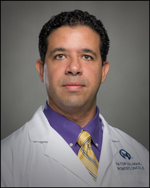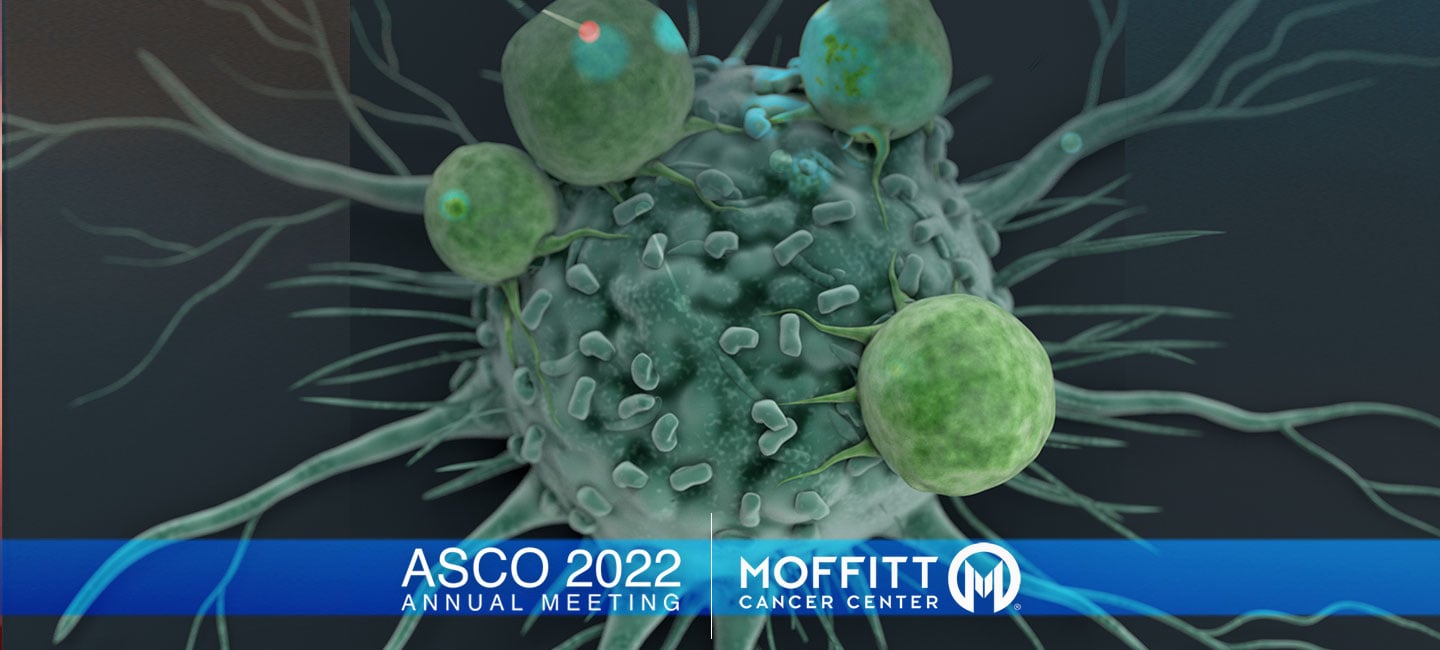New Data May Change Approach to Treating Multiple Myeloma, Ewing Sarcoma and Breast Cancer
New practice changing data presented at the 2022 American Society of Clinical Oncology Annual Meeting may soon influence standard of care treatment approaches in multiple myeloma, Ewing sarcoma and breast cancer. More than 40,000 oncology professionals are in Chicago for the five-day conference. Results from these clinical trials were shared in the plenary session, the main general session highlighting the best science of the meeting.
Utilizing Stem Cell Transplant Earlier in Multiple Myeloma
New clinical trial data show that using autologous stem cell transplant early in the course of treatment can improve progression-free survival in newly diagnosed patients with multiple myeloma. Moffitt Cancer Center’s Myeloma Program participated in the phase 3 DETERMINATION trial, a randomized study evaluating the benefits of standard of care with stem cell mobilization (collection of stem cells for possible use if the disease progresses) versus standard of care plus autologous stem cell transplant. The standard of care for this patient population is a triplet combination therapy known as RVd: lenalidomide (Revlimid®), bortezomib (Velcade®) and dexamethasone.
#ASCO22 Plenary Session: DETERMINATION trial results show that patients w/ ASCT had significantly better PFS vs those who didn't, but no difference in OS was observed. https://t.co/oniytCgR6Y #HemOnc #multiplemyeloma #mmsm
— ASCO (@ASCO) June 5, 2022
For the study, 722 patients ages 18 to 65 were randomly assigned to two arms. In the first arm, patients received three cycles of RVd, stem cell mobilization and an additional five cycles of RVd. Patients in the second arm received the chemotherapy drug melphalan, autologous transplant and then two cycles of RVd. Both arms received lenalidomide maintenance therapy until disease progression or drug toxicity.

Dr. Doris Hansen, Medical Oncologist, Blood and Marrow Transplant and Cellular Immunotherapy Department
The results showed median progression-free survival was 46.2 months in the nontransplant arm compared to 67.6 months among those receiving an autologous transplant. So far, no overall survival benefit has been seen when comparing autologous transplant to stem cell mobilization.
“Median progression-free survival was almost two years longer with autologous stem cell transplantation and maintenance Revlimid as part of initial therapy. Yes, the DETERMINATION trial did not demonstrate an overall survival benefit because at first relapse, these patients have access to other excellent therapies that also impact their survival,” said Dr. Doris Hansen, assistant member of the Blood and Marrow Transplant and Cellular Immunotherapy Department at Moffitt. “We need better ways to predict for serious secondary malignancies, maybe through CHIP [clonal hematopoiesis of indeterminate potential]. However, the majority of patients get deeper and more durable responses because of high dose melphalan and autologous transplantation.”
Subsequent treatment was necessary for 63% of patients in the nontransplant arm and 53% of patients in the autologous stem cell transplant arm. Of the patients in the nontransplant arm, 28% underwent a delayed transplant as part of this subsequent treatment.
Data Points to Best Chemotherapy Option for Rare Sarcoma
In the first randomized trial comparing treatment regimens for relapsed or treatment-resistant Ewing sarcoma, high-dose ifosfamide produced the best results, allowing patients to live nearly five months longer. Ewing sarcoma is rare, diagnosed in roughly 200 U.S. children each year. About 30% to 40% of patients with this type of sarcoma experience treatment resistance or the disease recurs.
#ASCO22 Plenary Session: DETERMINATION trial results show that patients w/ ASCT had significantly better PFS vs those who didn't, but no difference in OS was observed. https://t.co/oniytCgR6Y #HemOnc #multiplemyeloma #mmsm
— ASCO (@ASCO) June 5, 2022
The phase 3 rEECur trial evaluated toxicity and survival data for the four most commonly used chemotherapy regimens to treat relapsed or treatment-resistant Ewing sarcoma:
- High dose ifosfamide
- Topotecan plus cyclophosphamide
- Irinotecan plus temolozomide
- Gemcitabine plus docetaxel

Dr. Damon Reed, Medical Oncologist, Sarcoma Department
For the trial, 451 patients were enrolled. Initial participants were randomly assigned to receive one of the four regimens. However, the two least effective were dropped from the study, and later patients received one of the remaining two: high dose ifosfamide or topotecan and cyclophosphamide.
Median event-free survival, meaning the average time patients went before the disease worsened or death, was 5.7 months for ifosfamide compared to 3.7 months with topotecan plus cyclophosphamide. Overall survival was 16.8 months with ifosfamide versus 10.4 months with topotecan plus cyclophosphamide.
“The rEECur team should be applauded for conducting such a large study in the relapsed Ewing sarcoma patient population. They have defined standards for toxicity and expected outcomes to both guide treatment decisions and as a strong foundation for clinical trials,” said Dr. Damon Reed, chair of the Individualized Cancer Management Department and senior member of the Sarcoma Department at Moffitt. “These important contributions have demonstrated that there are several regimens with varying toxicities that can all be used in combination with novel agents and strategies. Importantly, responses were transient, and rEECur confirms that patients may need multiple strategies to improve long term survival.”
Possible New Standard of Care for HER2 Breast Cancer
About 15% of breast cancers overexpress the human epidermal growth factor receptor 2 protein, or HER2. This is an important target for multiple therapies. However, patients who do not overexpress HER2 tend not to respond to drugs targeting the HER2 protein, leaving few good treatment options for this subtype when patients progress on other approved therapies. But new data from the DESTINY-Breast04 trial demonstrate the use of trastuzumab deruxtecan (Enhertu®), a new HER2-targeting antibody-drug conjugate, doubled progression-free survival compared to standard of care treatment with conventional chemotherapy.
#ASCO22 Plenary Session: DETERMINATION trial results show that patients w/ ASCT had significantly better PFS vs those who didn't, but no difference in OS was observed. https://t.co/oniytCgR6Y #HemOnc #multiplemyeloma #mmsm
— ASCO (@ASCO) June 5, 2022
In the randomized phase 3 trial, 557 patients received either standard chemotherapy chosen by the physician or trastuzumab deruxtecan, a new antibody-drug conjugate that links trastuzumab, a HER2 monoclonal antibody, to deruxtecan, a topoisomerase I inhibitor that interrupts DNA replication in cancer cells.

Dr. Hatem Soliman, Medical Oncologist, Breast Oncology and Immunology Departments
At a median follow-up time of 18.4 months, patients who were HER2-low and hormone receptor positive and received trastuzumab deruxtecan had a 49% reduction in risk of disease progression and a 36% reduction in risk of death compared to those who received standard chemotherapy. Progression-free survival, the time during which the tumor was stable or shrank, was 10.1 months in the trastuzumab deruxtecan arm compared to 5.4 months for those who received standard chemotherapy. And overall survival was 23.9 months versus 17.5 months, respectively.
“The data from DESTINY-Breast04 was very exciting and the reaction from the audience at the conclusion of the presentation reflected the feeling that this represents a new standard of care for these patients. The results are clinically meaningful, and we will need to work on how to best identify patients who will benefit from this highly active therapy,” said Dr. Hatem Soliman, medical director of the Clinical Trials Office and medical oncologist in the Breast Oncology and Immunology departments at Moffitt.



